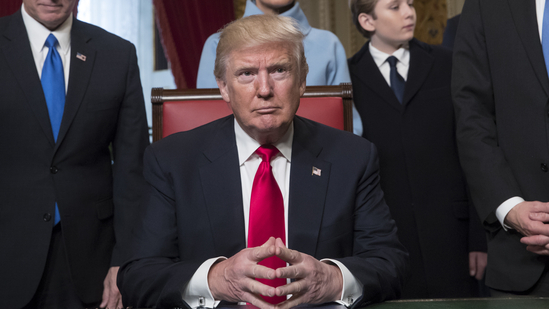Donald Trump Postpones Tariffs on Canada and Mexico Following Market Reaction
On Thursday, Donald Trump announced that additional tariffs would be imposed on April 2, stating they would be "reciprocal in nature."
The US President postponed certain tariffs aimed at Canada and Mexico, prompting the Canadian government to pause planned counteractions. This decision offers some relief for businesses and consumers after a significant market reaction.
Financial markets dropped sharply when Trump's tariffs, which could reach 25 percent, were implemented on Tuesday, as experts cautioned that widespread tariffs might hinder US economic growth and increase inflation.
However, on Thursday, Trump decided to delay new tariffs affecting Canadian and Mexican goods under the North American trade pact, though he rejected claims that his actions were a response to the market's downturn.
This pause, effective until April 2, brings comfort to car manufacturers.
In the automotive industry, components often pass back and forth across North American borders throughout production processes.
After discussions with the "Big Three" American car manufacturers—Stellantis, Ford, and General Motors—Washington previously announced a one-month exemption for vehicles under the United States-Mexico-Canada Agreement (USMCA).
A White House spokesperson informed journalists that approximately 62 percent of Canadian imports will still be subject to the new tariffs, though many of these are energy-related products that will face a reduced tariff rate of 10 percent.
Approximately fifty percent of imports from Mexico enter through the USMCA.
Trump stated on Thursday that the latest actions create "much more favorable conditions for our American car manufacturers."
Following Trump's announcement, Canadian Finance Minister Dominic LeBlanc communicated on X that Canada "will not move forward with the second round of tariffs on $125 billion of US goods until April 2, while we continue negotiations for an end to all tariffs."
Trump reiterated on Thursday that further tariffs would be introduced on April 2, indicating they would be "reciprocal in nature." He had previously promised reciprocal duties to address what Washington considers unfair trading practices.
At that time, Canadian and Mexican products may still incur tariffs.
The US President also declared that he would not alter existing tariffs for steel and aluminum imports, which are scheduled to go into effect next week.
Despite Trump’s partial delay of tariffs, US stock markets continued to decline on Thursday.






